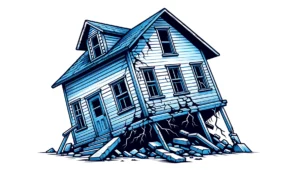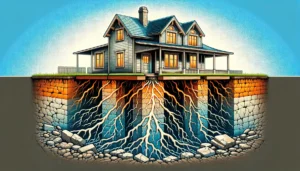Understanding the Soil Composition in North Texas
In this article, we’ll cover:
ToggleWhen it comes to the foundation of your home in North Texas, understanding the soil beneath your feet is crucial. Let’s break down the common soil types in this region and how they can impact your foundation stability.
Types of Soil in North Texas
- Clay Soil: Known for its expansive nature, clay soil can swell when wet and shrink when dry, exerting pressure on foundations.
- Sandy Soil: Offers good drainage but may lack stability, requiring proper foundation support.
- Loamy Soil: A mix of sand, silt, and clay, providing a balance that can be favorable for foundations.
Impact of Soil Composition on Foundation Health
- Expansive Clay Soil: The most common soil type in North Texas, it poses a risk of foundation movement due to its tendency to expand and contract.
- Soil Moisture Levels: High rainfall or drought conditions can cause soil to swell or shrink, affecting foundation stability.
How Different Soil Types Affect Foundations
- Clay Soil: Prone to causing foundation settling and cracks due to its expansive nature.
- Sandy Soil: Offers better drainage but may struggle to provide strong foundational support.
- Loamy Soil: Provides a balance between stability and drainage, but still requires careful consideration for foundation maintenance.
Understanding the soil composition beneath your home is the first step in safeguarding your foundation’s health. Have you assessed the soil type around your property? Consider consulting with a soil expert from Portman Foundation Repair for valuable insights tailored to your specific situation.
Environmental Factors Contributing to Foundation Problems
Your home’s foundation in North Texas is not only affected by the soil beneath it but also by various environmental factors. Let’s dive into how external elements can impact the health of your foundation and what you can do about it.
Effect of Weather Conditions on Foundation Health
- Rainfall: Excessive rain can saturate the soil, leading to swelling and potential foundation movement.
- Drought: Extended dry periods can cause soil shrinkage, creating voids that weaken foundation support.
- Temperature Fluctuations: Extreme hot and cold cycles can stress the foundation, causing cracks and shifting.
Importance of Proper Drainage Systems
- Gutters and Downspouts: Ensure rainwater is directed away from the foundation to prevent water accumulation.
- French Drains: Install these underground drainage systems to divert water and prevent soil saturation near the foundation.
- Grading: Slope the land away from the house to encourage proper water runoff.
How Landscaping and Trees Impact the Foundation
- Tree Roots: Large trees close to the house can dehydrate the soil, leading to foundation settlement.
- Soil Compaction: Heavy landscaping equipment near the foundation can compact the soil, affecting its stability.
- Mulching: Use mulch to retain moisture in the soil and prevent excessive drying, maintaining a stable foundation environment.
Exploring how environmental factors interact with your foundation sheds light on potential issues and preventive measures. Have you assessed your drainage systems and landscaping recently? Taking proactive steps can go a long way in safeguarding your home’s foundation against external influences.
Construction Defects and Poor Maintenance Practices
In the world of foundation health, construction quality and maintenance routines play a significant role. Let’s uncover how construction defects and neglecting upkeep can lead to foundation issues in North Texas homes.
How Construction Quality Impacts Foundation Integrity
- Poor Foundation Preparation: Inadequate soil compaction or improper site preparation can weaken the foundation’s stability.
- Subpar Drainage Installation: Faulty drainage systems can lead to water accumulation, affecting the soil’s moisture levels and causing foundation shifts.
- Weak Concrete Mix: Using substandard concrete can result in cracks and structural damage over time.
Importance of Addressing Plumbing Leaks Promptly
- Water Damage: Leaking pipes can saturate the soil beneath the foundation, leading to settlement and cracks.
- Mold and Mildew: Damp conditions from plumbing leaks can foster mold growth, further compromising the foundation’s integrity.
Impact of Settling on Foundation Stability
- Uneven Settlement: Differential settling can result in sloping floors, wall cracks, and doors that don’t align properly.
- Structural Stress: Unequal settling puts stress on the foundation, potentially leading to more severe structural issues.
Identifying construction defects and practicing proper maintenance can help you steer clear of foundation troubles. When was the last time you checked for plumbing leaks or inspected your foundation for settling signs? Proactive measures today can save you from costly repairs tomorrow.
Professional Inspections and Preventive Measures
When it comes to protecting your home’s foundation in North Texas, proactive steps like regular inspections and preventive measures can make all the difference. Let’s uncover the importance of professional oversight and practical actions you can take to keep your foundation strong.
Importance of Regular Foundation Inspections
- Scheduled Check-ups: Have a professional inspect your foundation annually or after significant weather events.
- Early Detection: Detecting issues early can prevent minor concerns from escalating into major repairs.
- Professional Insight: Experts can provide tailored advice based on your specific foundation type and soil conditions.
Tips for Maintaining a Healthy Foundation
- Monitor Moisture Levels: Ensure proper drainage and watch for signs of excessive moisture buildup near the foundation.
- Repair Cracks Promptly: Address any visible cracks in walls or floors to prevent further damage.
- Address Plumbing Issues: Fix leaks promptly to prevent water from affecting the foundation.
Addressing Issues Early to Prevent Costly Repairs
- Timely Action: Don’t delay addressing foundation concerns to avoid more extensive and expensive repairs later.
- Invest in Maintenance: Regular upkeep and minor repairs can prolong the life of your foundation and save you money in the long run.
- Seek Professional Help: When in doubt, consult with a foundation specialist to assess any potential issues accurately.
Taking the time to invest in professional inspections and proactive maintenance can be the key to a stable foundation. Have you scheduled your next foundation check-up? How do you plan to implement preventive measures to safeguard your home’s foundation? Be proactive, and your foundation will thank you for it.
Secure Your Foundation Today
In conclusion, understanding the soil composition and environmental factors impacting your foundation, along with addressing construction defects and practicing preventive maintenance, are crucial steps in ensuring a stable foundation for your home in North Texas. By taking proactive measures now, such as regular inspections and timely repairs, you can prevent costly foundation issues in the future. Don’t wait for problems to arise – take action to safeguard your foundation today and consult with experts from Portman Foundation Repair in Dallas for personalized guidance. Your home’s foundation deserves the best care possible.



